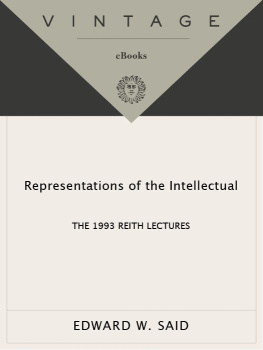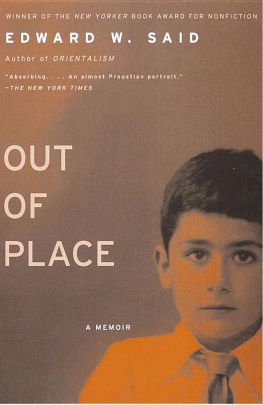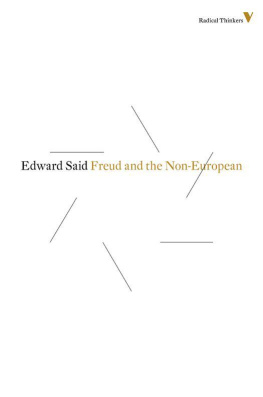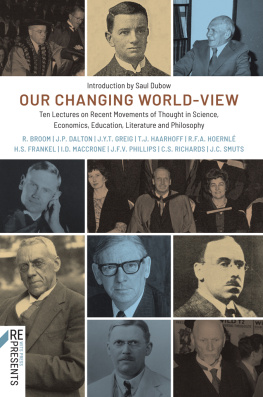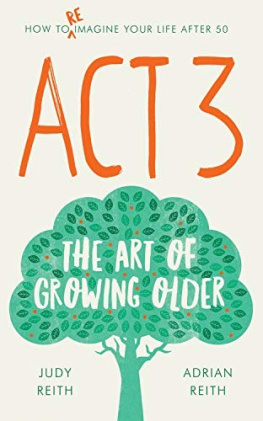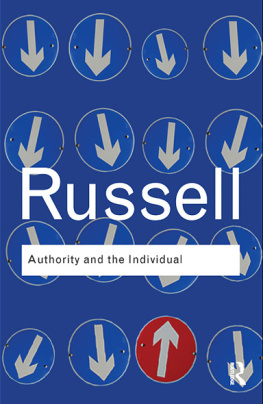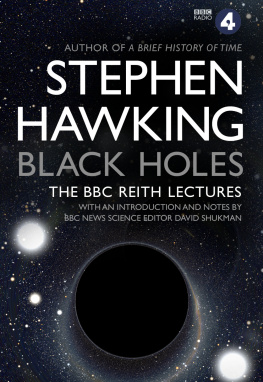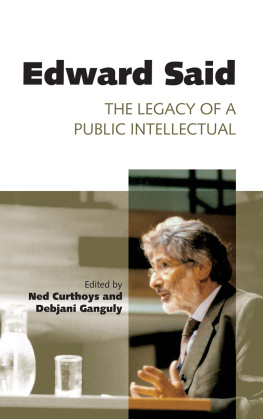Acclaim for EDWARD W. SAIDs
Representations of the Intellectual
Edward Said defines a corrective way to think about politics, drawing an urgent and absolutely necessary line between individual responsibility and the authority of consensus.
Joan Didion
Edward Said is that rare sort of intellectual who is able to illuminate even the stormiest of human prospects with a serene, often revelatory light that shows us not only the obligatory two sides to every question, but the often overlooked third dimension as well.
Gore Vidal
Said, one of our leading literary critics, is a rare example of an American academic who is also an intellectual in the European sense.
Camille Paglia
Courage, independence of mind, scholarship, compassion for the oppressed. Absent though these qualities may be from our official intellectuals, they are present in force in the person and works of Edward Said.
Alexander Cockburn
Also by EDWARD W. SAID
Joseph Conrad and the Fiction of Autobiography
Beginnings: Intention and Method
Orientalism
Reaction and Counterrevolution in the Contemporary Arab World
The Question of Palestine
Literature and Society
Covering Islam
The World, the Text, and the Critic
After the Last Sky
Blaming the Victims: Spurious Scholarship
and the Palestinian Question
Musical Elaborations
Culture and Imperialism
The Politics of Dispossession:
The Struggle for Palestinian Self-Determination, 19691994
Peace and Its Discontents:
Essays on Palestine in the Middle East Peace Process
EDWARD W. SAID
Representations
of the Intellectual
An internationally renowned literary and cultural critic, Edward W. Said is University Professor at Columbia University. He is the author of fourteen other books, including Orientalism, which was nominated for the National Book Critics Circle Award, Culture and Imperialism, The Politics of Dispossession, and, most recently, Peace and Its Discontents.
First Vintage Books Edition, April 1996
Copyright 1994 by Edward W. Said
All rights reserved under International and Pan-American Copyright Conventions. Published in the United States by Vintage Books, a division of Random House, Inc., New York, and simultaneously in Canada by Random House of Canada Limited, Toronto. Originally published in Great Britain in hardcover by Vintage Books (UK), London, in 1994. First published in the United States in hardcover by Pantheon Books, a division of Random House, Inc., New York, in 1994.
The Library of Congress has cataloged the Pantheon edition as follows:
Said, Edward W.
Representations of the intellectual : the Reith lectures / Edward W. Said.
p. cm.
eISBN: 978-0-307-82962-7
1. Intellectuals. 2. Intellectuals in literature. I. Title.
II. Title: Reith lectures.
HM213.S225 1994
305.552dc20 94-3950
v3.1
For Ben Sonnenberg
CONTENTS
INTRODUCTION
T HERE IS NO equivalent for the Reith Lectures in the United States, although several Americans, Robert Oppenheimer, John Kenneth Galbraith, John Searle, have delivered them since the series was inaugurated in 1948 by Bertrand Russell. I had heard some of them over the airI particularly remember Toynbees series in 1950as a boy growing up in the Arab world, where the BBC was a very important part of our life; even today phrases like London said this morning are a common refrain in the Middle East. They are always used with the assumption that London tells the truth. Whether this view of the BBC is only a vestige of colonialism I cannot tell, yet it is also true that in England and abroad the BBC has a position in public life enjoyed neither by government agencies like the Voice of America nor by the American networks, including CNN. One reason is that programs like the Reith Lectures and the many discussion and documentary shows are presented by the BBC, not so much as officially sanctioned programs, but as occasions that offer listeners and viewers an impressive range of serious, often distinguished material.
I was therefore very honored to be offered the opportunity by Anne Winder of the BBC to give the 1993 Reith Lectures. Because of scheduling problems we agreed on a date in late June rather than the customary January time slot. But almost from the moment that the announcement of the lectures was made by the BBC in late 1992 there was a persistent, albeit relatively small chorus of criticism directed at it for having invited me in the first place. I was accused of being active in the battle for Palestinian rights, and thus disqualified for any sober or respectable platform at all. This was only the first in a series of plainly anti-intellectual and antirational arguments, all of them ironically supporting the thesis of my lectures about the public role of the intellectual as outsider, amateur, and disturber of the status quo.
These criticisms do in fact reveal a great deal about British attitudes to the intellectual. Of course these are attitudes imputed to the British public by journalists, but the frequency of their repetition gives these notions some current social credibility. Commenting on the announced themes of my Reith LecturesRepresentations of the Intellectuala sympathetic journalist states that it was a most un-English thing to talk about. Associated with the word intellectual was ivory tower and a sneer. This depressing train of thought is underlined by the late Raymond Williams in Keywords. Until the middle twentieth century unfavourable uses of intellectuals, intellectualism and intelligentsia
One task of the intellectual is the effort to break down the stereotypes and reductive categories that are so limiting to human thought and communication. I had no idea of the limitations to which I was subject, before I gave the lectures. It was often said by complaining journalists and commentators that I was a Palestinian, and that, as everyone knew, was synonymous with violence, fanaticism, the killing of Jews. Nothing by me was quoted: it was just supposed to be a matter of common knowledge. In addition, I was described in the sonorous tones of The Sunday Telegraph as anti-Western, and my writing as focused on blaming the West for all the evils of the world, the Third World especially.
What seemed to have completely escaped notice was everything I had actually written in a whole series of books, including Orientalism and Culture and Imperialism. (My unforgivable sin in the latter is my argument that Jane Austens Mansfield Parka novel I praise as much as I do all her workalso had something to do with slavery and British-owned sugar plantations in Antigua, both of which of course she mentions quite specifically. My point was that just as Austen talks about goings-on in Britain and in British overseas possessions, so too must her twentieth-century reader and critics, who have for too long focused on the former to the exclusion of the latter.) The construction of fictions like East and West, to say nothing of racialist essences like subject races, Orientals, Aryans, Negroes and the like, were what my books attempted to combat. Far from encouraging a sense of aggrieved primal innocence in countries which had suffered the ravages of colonialism, I stated repeatedly that mythical abstractions such as these were lies, as were the various rhetorics of blame they gave rise to; cultures are too intermingled, their contents and histories too interdependent and hybrid, for surgical separation into large and mostly ideological oppositions like Orient and Occident.

